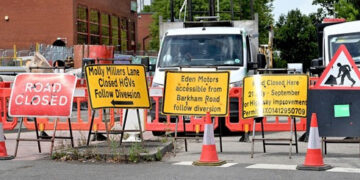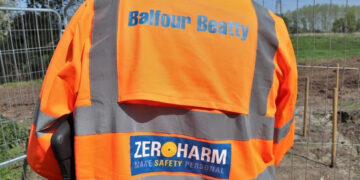Two weeks ago, if you believe that Britain’s a two party state, one of the main contenders for the post of Home Secretary demonstrated their numerical skills in a radio interview.
The Home Secretary is Britain’s chief policeman. She’s responsible for national security; accountable for MI5; also answerable for immigration; but not for Justice*.
This contender said, without a hint of irony or self-perceived error, that their party’s proposed 10,000 new police officers were going to cost £30 a year. Each !!!
When Sir Robert Peel was Home Secretary, he brought in the first thousand Metropolitan Police. Working seven days a week, without pensions, and just five unpaid holiday days a year, their annual pay was just over £51.
But this was 1829 and Queen Victoria was only 10 (she wouldn’t be the queen for another 8 years). Wages have gone up a bit since.
But this was radio. The real test would be TV, where the lights are brighter and the audiences greater. Turning up the illumination …
The Dimmer Switch
The thesis on Sunday’s Andrew Marr Show was that the election campaigns had been “pushed off course by the hideous Manchester murders”. The set piece interviews this week were to be with the main contenders for Home Secretary: Labour’s Diane Abbott and Conservative’s Amber Rudd, one after the other.
Among other topics, Ms Abbott was quizzed about her comments on abolishing MI5 and Special Branch; a statement supporting the IRA about the defeat of the British state; and a vote against legislation proscribing Al Qaeda (among nine other groups).
Her responses were respectively that she felt MI5 needed reforming and that it had been; that she’d changed her hairstyle as well as her views since then; and that the list included groups she deemed to be dissidents, not terrorists.
Making allowances for the cliche that one man’s freedom fighter is another man’s terrorist, a check on the list of ten names reveals that seven have been widely labelled as terrorist organisations. One’s under UN embargo for its links to Al Qaeda. The last two, in Aden and Algeria, are listed as terrorists by two countries respectively. All have claimed lives.
After a brief segue about a subsequent programme to let Amber Rudd switch into place on the hot seat, Andrew Marr started the second interview.
Among other topics, Ms Rudd was quizzed about a step change in security following the MCR bombing; the number of times the security services had been tipped off about the MCR bomber; the number of jihadis that had come back into the UK from Libya, Syria etc.
Her responses were respectively to praise the emergency services for preparing and rehearsing since 2014 on how to tackle an incident; “not to be drawn in on what the intelligence services did or didn’t know”; and “I don’t know those details, the security services are preparing a report”.
From both sets of responses, you might want to reflect as to whether either contender for Home Secretary has the sensitivity, sharpness of mind and soundness of judgement to be the person that we’re going to trust with ours and our family’s lives and safety over the next five years.
Also, can we trust them to do the job properly when they are away from the bright lights of the TV studio and things are less well lit ?
Whoever’s giving the job, they’re going to need all of their wits about them, not just half of them.
Deploying the “extra spare shovel”
At the end of her interview, Ms Rudd made commented on having changed her hairstyle a number of times in the past 34 years, but not having changed her views as to how we keep the public safe.
You might want to reflect on her judgement making an unsolicited comments about political opponents on live TV.
Also, in the light of her unchanged views, as to whether she’s learned much in the past three decades.
As number of my old bosses first told me then later reminded me “Tony, when you’re in a hole, it’s best to stop digging”.
Then again, I’m just an observer, not a candidate for one of the greatest offices of state.
I wonder where my extra spare shovel went on Sunday ?
It’s the Manifesto stupid
I’ve a huge respect for the skills as well as the courage of the leading TV interviewers, also those being interviewed.
But the adversarial style and the pace of live TV doesn’t encourage careful consideration of complex topics.
Which is why I’ve been reading the manifestos this last week – now that some of them have finally been published.
So far I’ve read Conservative, Labour, Liberal Democrat and UKIP. In that order. This brings the lifetime total number of manifestos read to, well, errr, four.
But these four accounted for 88% (~27 million out of about 31 million) of the people who voted in 2015’s general election.
And before everyone starts jumping up and down on my all too easily bruised carcass, yelling that I should be counting the number of MP’s elected, I’d like to make an observation.
In the United Kingdom of Great Britain and Northern Ireland of one’s parents (or grandparents), the Labour and Conservative parties accounted for over 90% of the votes cast. So it was fair to say that the country was a two party state.
At the 2015 general election, our decidedly multi-cultural, partly devolved, and somewhat over-governed Britain had 32.7% of the votes cast for other parties. That’s a whisker under one third of the voters not voting for the big two.
One third – so things have changed.
The have’s will argue one way and the have not’s the other: as to whether our elections and therefore our Representatives are, well, representative.
But that’s for another day – after whatever “surprise” the 2017 Election throws up.
Lots of Promise, possibly
Please bear in mind that what follows is merely one person’s opinion, and one not very clever at reading manifestos either.
But having read four so far, one can see why the electorate might have a teensy-weensy cause for concern with the parties and, by extension the politicians, and on to politics itself.
From a commercial standpoint, these are the business proposals for running one of the world’s more established parliamentary democracies. They set out a serious of measures that are being proposed as to how your tax monies get spent.
In the main, I can’t tell if the numbers being presented are incremental, decremental or excremental. Mostly the latter I suspect.
As to the ideas, some of them are written in a language that I just didn’t understand. So I read them again, looked up various terms, went online for explanations, even in one or two cases, made some wild guesses as to what the writers were trying to say.
Regular readers will know by now that my first language is gibberish. English comes second.
So you’ll probably understand when I say that I know when I’ve been thoroughly outgibberished.
And after reading three of them, I was ready to throw.
Out, down, up or something.
Getting down to business
The Conservative Manifesto (84pp) can be looked at in two different ways.
As a conventional set-piece with a sort of 20th century style construction and overall meaning. If so, it’s full of manure and badly thought out and very badly costed.
But it might be an outline for a future Britain very different from the 19th & 20th century models. One in which the sheer uncertainty of the Brexit negotiations, coupled with the novelty of some of the ideas, would make accurate costings not only impossible but completely inappropriate.
The Labour Manifesto (124pp) was equally challenged, but there’s a rather different basis for this view.
On the one hand it seems to promise the sort of tax and spend echo of the past, nationalisation, unionisation and bash the rich. If so, it’s very badly thought out (or written) and if it’s fully costed, then I missed it.
But it might be an outline for a future Britain which doesn’t ditch the past completely but tries to adopt and adapt the good bits while avoiding the not so good bits. However the writing and the polemic sometimes gets in the way of the ideas and there are whole sections that I didn’t fully comprehend, so can’t judge fairly.
The Liberal Democrat Manifesto (94pp) was a bit different.
On the one hand it opened well, and pages 4-6 had a realistic view of the party’s prospects and the first positive vision for the future in over 200 pages of reading.
On the other hand, it wasn’t clear on the costs, scope and practicality of what otherwise might have been some interesting ideas and proposals for the future of our country. I did discover that their proposal for another EU referendum wasn’t as I’d understood it from TV, nor was it as daft as I’d been led to believe.
The UKIP Manifesto (62pp) was completely different.
It was written in a way where you could clearly understand the proposals being made, then either agree or disagree with them quite easily. While there were a few where costs hadn’t been spelled out, this manifesto was unique in that it had a five year plan at the end showing where the money was coming from and where it would be going.
On the other hand, there were a sprinkling of ideas or expressions where the writer got a bit carried away and their frothiness (foam perhaps) was visible in the words on the page. There’s a marvellous mix of English eccentricity that ranges from barkingly bonkers to carrying on, but not calmly. Still, at least the views are clear, even if they range from stark to starkers at times.
So what’s not to like?
Space, time and your patience doesn’t allow the full monty. So here’s some snapshots of the emperors’ new clothes – 32 words for each party:
A stealth death tax – where government locusts descend on a bereaved family to feast on the dead person’s house. And the “cap” will protect “the rich” far more than it does you. (Con)
The welfare system’s broken – it needs protecting – let’s replace the nanny state with the nappy state, but the invisible gets overtaken by the incomprehensible. What are the SMART** goals, costs and consequences ? (Lab)
Leaps tall buildings, faster than a speeding bullet, walks on water – so far you’ve promised “MORE” of everything I want – but I either don’t know or can’t believe you’ve costed it properly. (LibDem)
Yeeeehaaaa – LESS government !!!! (p47 of the fourth manifesto). But even my credulity and belief were utterly broken nine pages earlier. If “extremism” is such a difficult issue, an opposite extreme isn’t credible. (UKIP)
And Finally …
“A week is a long time in politics”. Harold Wilson (attrib.)
Until next week then !
~~~~~~~~~~~~~~~~~~~~~~~~~~~~~~
The New Brooms – Sweeping clean …
… or just off the page ?
From a Shute End council meeting last week it appears that secrecy on how your money gets spent might be set to continue.
Then again, both representatives of the ONLY newspaper present might have misunderstood the redacted order papers. But I’m certain that the Editor of this article and this newspaper didn’t.
Misunderstand, that is.
Talk to me …
* Justice was transferred to the Lord Chancellor back in 2005.
** Specific, Measurable, Achievable, Relevant & Realistic, Time bounded

















































